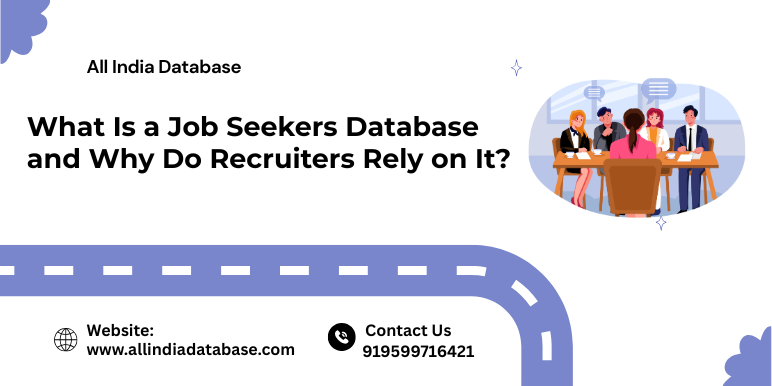Blogs
What Is a Job Seekers Database and Why Do Recruiters Rely on It?
What Is a Job Seekers Database and Why Do Recruiters Rely on It?
Imagine having a file with tens of thousands of candidates in it. Not only that, imagine trying to find information about each candidate in this sheet one by one. It would be a pain! There is a Job Seekers Database that helps a lot.
It saves marketers time and effort by eliminating the need to write down information, stay up to date on new developments, share job openings on multiple platforms, and more. Let’s get into more specifics:
What is a Job Seekers Database?
This database stores all of your individuals’ information, as well as information about open positions, applications, and more. This information is very readable, which helps the recruiter’s job a lot. It helps them keep track of all the people who have reached out to them or been in touch with them. With the help of tools for hiring, it keeps growing.
Benefits of Using a Job Seekers Database
Using a Job Seekers Database can make the hiring process much faster and more effective. Here are all the best things you can do with it:
- Access a Massive Pool of Passive Candidates
A poll by Zippia found that 73% of possible job candidates are passive job seekers who are willing to hear about good chances and might even apply to them. Traditional job posting sites only get active job hunters. A Job Seekers Database, on the other hand, lets you reach a wide range of people, even those who aren’t actively looking for work but have the skills and experience your company needs. Find these people and get to know them. This will help you meet your future talent needs and give you access to a larger talent group.
- Reduce Time to Fill
A Job Seekers Database makes it easier to choose candidates. You don’t have to go through the whole hiring process to fill a new role, so you don’t have to rely on job boards as much. Instead, you can use your potential information to find the right person for the job.
- Save Hours on Admin Tasks
It saves a lot of time and cuts down on the hours spent on routine tasks thanks to the Job Seekers Database. Because it centralises candidate information in a searchable store, you don’t have to sort through multiple data sources. It gets rid of the need for filing methods like spreadsheets, emails, and hard drives that are hard to use.
- Streamline Team Collaboration
A Job Seekers Database makes it easier for the hiring team to work together. Rather than sending and receiving emails or making changes to spreadsheets by hand, multiple team members can view and change potential information at the same time.
How to Find the Correct Recruitment Database for Your Organization?
In order to pick the best employment database for your business, you should pay attention to the following:
- Easily Accessible: There should be no problems getting to your employment information at any time of the day or night.
- A One-stop Solution: Everything needs to be in one place, whether it’s offering jobs, finding applicants, shortlisting them, or turning them down.
- Tagging and Easy Management: Using tags makes it easier for administrators to find specific applicant information.
- Job Distribution: A current candidate database can post job openings on a number of job boards, social media sites, and websites.
- Find the Source of Applications: Identify the best sources of good hires to meet your company’s KPIs.
- Stats and Reporting: A good system should give reports on time-to-hire, source of hire, and candidate satisfaction.
- Customer Support: Reliable customer service via chat, phone, or email is essential for smooth hiring processes.
Conclusion
A Job Seekers Database is more than just a digital file cabinet; it’s a sophisticated tool that lets recruiters keep track of applicant information, search for it, and manage it all easily. It changes the hiring process from a reactive, data-driven one to a more proactive one by streamlining administrative chores, shortening the time it takes to fill a position, and giving you access to a wider pool of both active and passive applicants.
Modern recruitment databases give teams the tools they need to make quicker, smarter recruiting choices. These tools include job distribution, tagging, collaborating in real time, and extensive analytics. When choosing a database, you should search for one that is easy to use, centralised, and has clever features that meet all of your recruitment needs from start to finish.

Pingback: What Is a Job Seekers Database and How Does It Work? – Buy Database For Marketing India